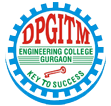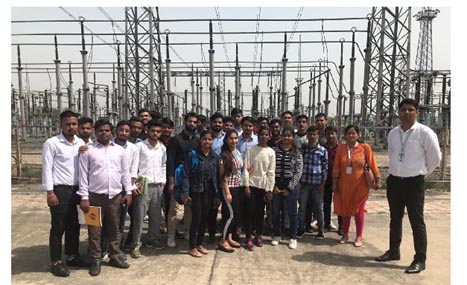- Overview
- Courses Available
- HoD Message
- Faculty
- Vision & Mission
- PEOs and PO’s
- Labs. & Infrastructure
- Employment Opportunities
- Clubs
- Training & Placement
- Syllabus and Scheme of Study
- Previous Year’s MDU Question Papers
Overview
Department Overview
Electrical engineering is one branch of the engineering profession, and is concerned with the understanding of electricity and the development of electronic systems.
The field of electrical engineering was established at the end of the 19th century when electricity generation and telegraph systems were being developed. The field has grown to encompass the computing and electronics fields, in addition to telecommunications and power transmission.
An Electrical Engineering student can opt for any one /more of the following braches/fields for their careers:
- Power – The creation, storage, and distribution of electricity for industrial, commercial, residential, or municipal use.
- Control – The design and development of electronic systems that rely on inputs to control the outputs of a system or process, such as aircraft autopilot systems.
- Electronics/Microelectronics – The design and development of electronic circuits, including analog circuits, integrated circuits, microprocessors, and other semiconductor components.
- Signal Processing – The evaluation of analog or digital electronic signals, including filtering, data analysis, signal manipulation, compression or amplification.
- Telecommunications – The design and development of voice or data transmission systems, including cable, fiber optic, or wireless systems as a transmission path.
- Instrumentation – The development of sensors data acquisition equipment to measure the characteristics of objects or systems.
- Computers – The design and development of computer systems, from computer gaming consoles and portable data assistants (PDAs) to desktop computers and server systems.
Courses Available
Courses Available
| Graduate Courses | ||
|---|---|---|
| B.Tech. Electrical Engineering | 30 Seats | View Details |
HoD Message
HoD Message

Ms. Devjani Bhattacharya
M.E, pursuing PhD
Electrical Engineering Bachelor’s degree is currently available from the department with the primary goal of offering both basics and program that are industry/future ready. The department has a committed team of faculty members who are supported by equally committed, qualified laboratory staff. The program includes collaboration with industry in the form of industrial tours, student training, expert lectures, and the organization of seminars and workshops. The department provides placements from eminent firms like Jindal Steel Pvt. Ltd, Leisxir etc. I extend a warm welcome to all the potential students to the Department of Electrical Engineering at the DPGITM Campus in Gurgaon. I want to express my gratitude to the management, the managing director, the director, all of my faculty members and my students for helping me at every turn to maintain the department’s reputation for excellence.
Faculty
Faculty
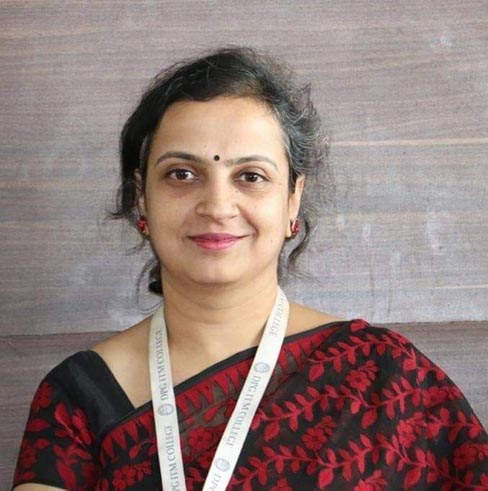
Ms. Devjani Bhattacharya
HOD & Assistant Prof.
Qualification: B.E, M.E, PhD (Pursuing, Bengaluru, Karnataka)
Area of Interest: Control Systems
Teaching experience: 14 years
International Conference: 02 (Scopus indexed), with one extended paper published as Book chapter at Springer (LNEE)
Communicated Journal paper (Scopus Indexed): 01
International Journal: 03 (Google scholar indexed)

Dr. Galiveeti Hemakumar Reddy
Associate professor
Qualification: B.Tech, MTech and PhD
Experience : 4.8 Yrs of Teaching
Area of Interest : Power System Reliability, Power Quality, Smart Grid,
Scopus/SCI Papers: 13
International Conferences: 19

Ms. Pushpanjali Singh Bisht
Assistant Prof.
Qualification: B.Tech, MTech
Area of interest: Electrical machines
Experience: 13 years
SCI / SCOPUS paper: 1
Book chapter Apple Academic press: 1

Ms. Swati Sharma
Assistant Prof.
Qualification: B.Tech, M.Tech
Area of Interest: Instrumentation, Electrical Machines, Control systems and Power systems
Experience: 6+ Years of Teaching and Industrial Experience.
International Conference: 08 (Scopus indexed)
SCI/SCIE Journal paper: 02
International Journal: 03

Mr. Ramesh Kumar
Lab Technician
Qualification: Diploma in Electrical Engineering
Area of Interest: Transformers, Motors
Experience: 12 Years
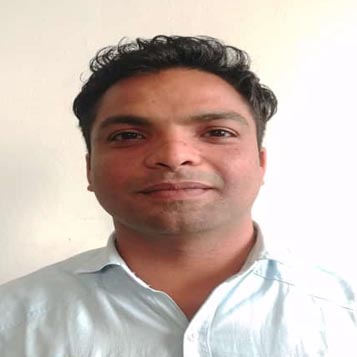
Mr. Deepak Kumar
Lab Technician
Qualification: B.Tech
Area of Interest: Transformers, Motors
Experience: 1 Year of experience
Vision & Mission
Vision & Mission
Vision
To produce technical and knowledge based quality engineers with ethical and emotional strength for converting global challenges into opportunities in the field of Electrical Engineering contributing towards nation building and progress of humanity.Mission
- To impart quality education in the areas of electrical engineering for enhancing the opportunities for employment, higher education, innovation, entrepreneurship.
- To maintain a positive academic environment that promotes excellence in learning through constructive interaction among students, faculty, alumni and Industry.
- To excel in imparting domain specific technical education through effective teaching learning process, creativity and critical thinking in applying engineering skills to face the fast growing global challenges and opportunities.
- Moulding the graduates into world class technocrats for life-long learning to meet intellectual, ethical and career challenges.
PEOs and PO’s
Programme Educational Objectives (PEOs)
PEO 1. To provide students with foundation in fundamental engineering principles together with in depth domain knowledge, solid foundation in the areas of electrical engineering , scientific as required succeeding in technical profession
PEO 2.To train students with good scientific and engineering knowledge to comprehend, analyze, design, experiment, simulate and create products for real life problem.
PEO 3. To develop students with effective conversational skills, team work, multidisciplinary approach, professional attitude to work successfully in various industrial and government ac.inanizations, entrepreneurial pursuit both at the National and International level, with professional competence and ethics.
PEO 4.To provide student with an academia environment for leadership, self-motivated lifelong learning attitude for successful professional carrier.
PROGRAM OUTCOMES (POs)
- Engineering knowledge: Apply the knowledge of mathematics, science, engineering fundamentals, and an engineering specialization to the solution of complex engineering problems.
- Problem analysis: Identify, formulate, review research literature, and analyze complex engineering problems reaching substantiated conclusions using first principles of mathematics, natural sciences, and engineering sciences.
- Design/development of solutions: Design solutions for complex engineering problems and design system components or processes that meet the specified needs with appropriate consideration for the public health and safety, and the cultural, societal, and environmental considerations.
- Conduct investigations of complex problems: Use research-based knowledge and research methods including design of experiments, analysis and interpretation of data, and synthesis of the information to provide valid conclusions.
- Modern tool usage: Create, select, and apply appropriate techniques, resources, and modern engineering and IT tools including prediction and modeling to complex engineering activities with an understanding of the limitations.
- The engineer and society: Apply reasoning informed by the contextual knowledge to assess societal, health, safety, legal and cultural issues and the consequent responsibilities relevant to the professional engineering practice.
- Environment and sustainability: Understand the impact of the professional engineering solutions in societal and environmental contexts, and demonstrate the knowledge of, and need for sustainable development.
- Ethics: Apply ethical principles and commit to professional ethics and responsibilities and norms of the engineering practice.
- Individual and team work: Function effectively as an individual, and as a member or leader in diverse teams, and in multidisciplinary settings.
- Communication: Communicate effectively on complex engineering activities with the engineering community and with society at large, such as, being able to comprehend and write effective reports and design documentation, make effective presentations, and give and receive clear instructions.
- Project management and finance: Demonstrate knowledge and understanding of the engineering and management principles and apply these to one’s own work, as a member and leader in a team, to manage projects and in multidisciplinary environments.
- Life-long learning: Recognize the need for, and have the preparation and ability to engage in independent and life-long learning in the broadest context of technological change.
Labs. & Infrastructure
Labs. & Infrastructure
Basics of Electrical Engineering Lab
Basic of Electrical Engineering focuses on the understanding and application the principles of electrical engineering. The purpose of Basic of Electrical Engineering lab is to introduce students with implementation of practical concepts that are taught in theory. The Basic of Electrical Engineering lab is equipped with Norton Theorem apparatus, Ohm’s law kit, series, and parallel resistance kit, KVL and KCL apparatus etc. Students are encouraged to use their creativity and problem-solving skills to explore and think about the unique problems in the world of electrical & electronics engineering through experimenting in their Basic of Electrical Engineering lab.
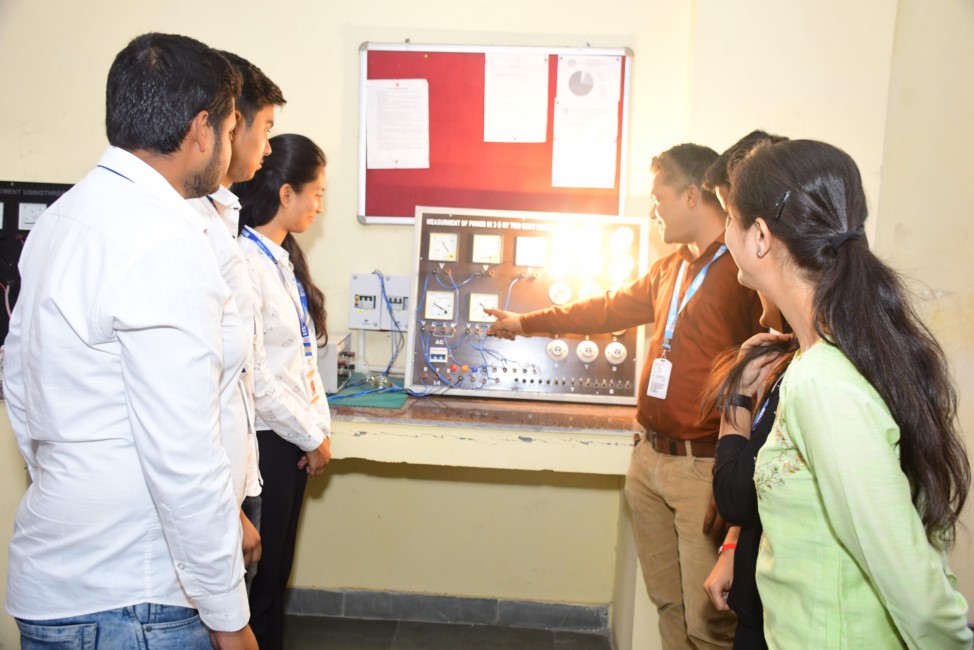
Electrical Machines Lab
The Electrical Machines Laboratory in Electrical Engineering Department is intended specifically to meet the needs of modern courses and its fundamentals in electrical machines. The Electrical Machines provides the means to study the different areas, including the operation, analysis and performance of Electro-technology, Single Phase Transformers, Three Phase Rotating Machines like DC Machines, Single & Three Phase induction machines.
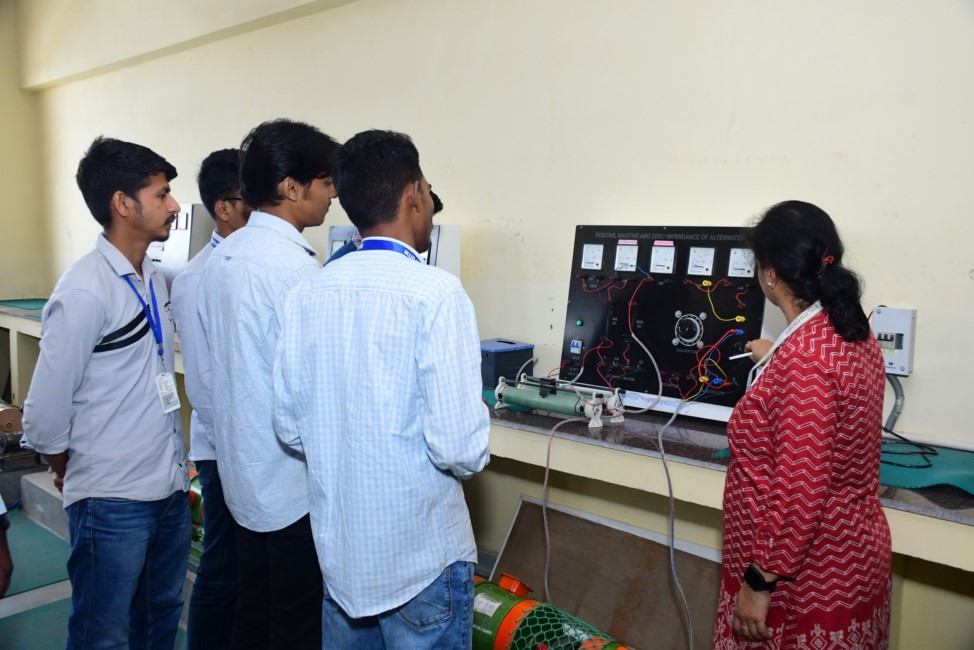
Control System Lab
In today’s world of automation Control System Engineering forms, a very important subject in the Electrical Engineering field where the students are exposed to contemporary control system equipment in a realistic manner, in order to connect theoretical material taught in lecture courses with the realities of physical hardware and simulation through ‘higher-level’ technical computing language. In this lab the students get hands on how a control system is used for controlling errors. The lab has kits like Speed torque characteristics AC servo motor, Speed torque characteristics of AC and DC servo motor, Synchro-transmitter and receiver trainer, Magnetic Amplifier, PID controller kit, and compensation network study kit etc. The students also learn about the stability of the control system through MATLAB programming.
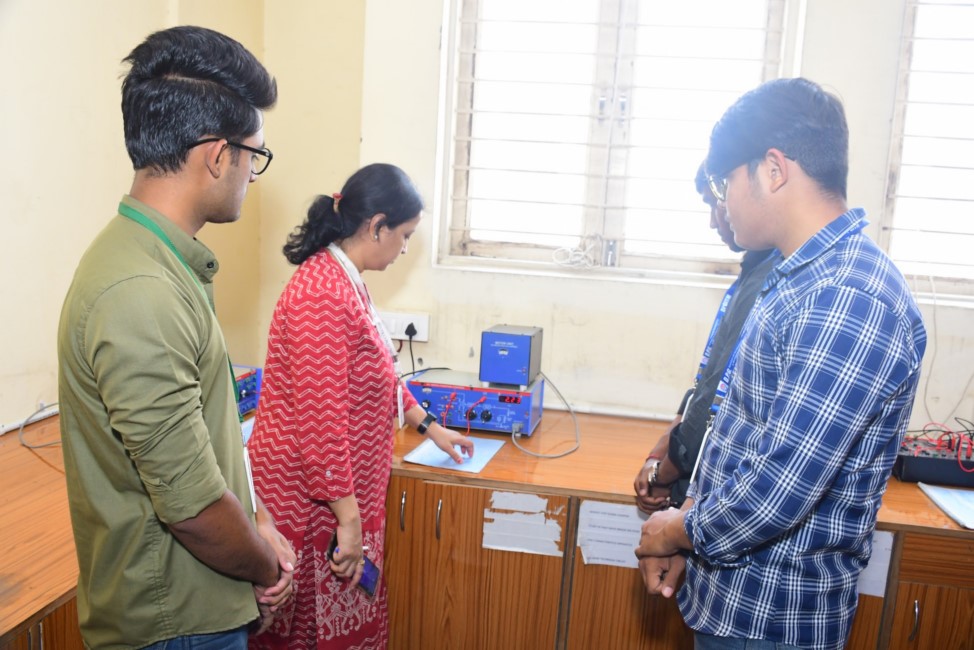
Electrical Circuital Lab
This lab comprises of protection, simulation, high voltage and machine related experiments. Facilities are available for different relays. Varieties of Power System Simulation packages like MATLAB is available.
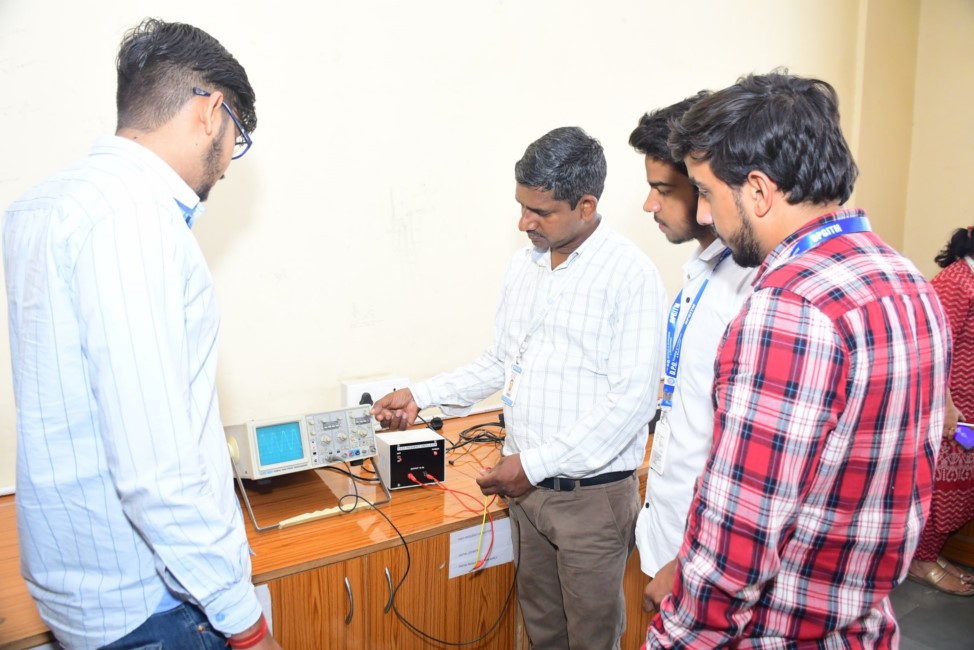
Power Electronics Lab
This lab enhances the electrical engineering students by providing them the better understanding of the concepts and working of advanced power semiconductor devices and power electronics circuits. The lab is equipped with prominent power electronics equipments like AC voltage controller using SCR and TRAIC, series inverter, single phase half converter, single phase full converter, UJT triggering circuits and many more.
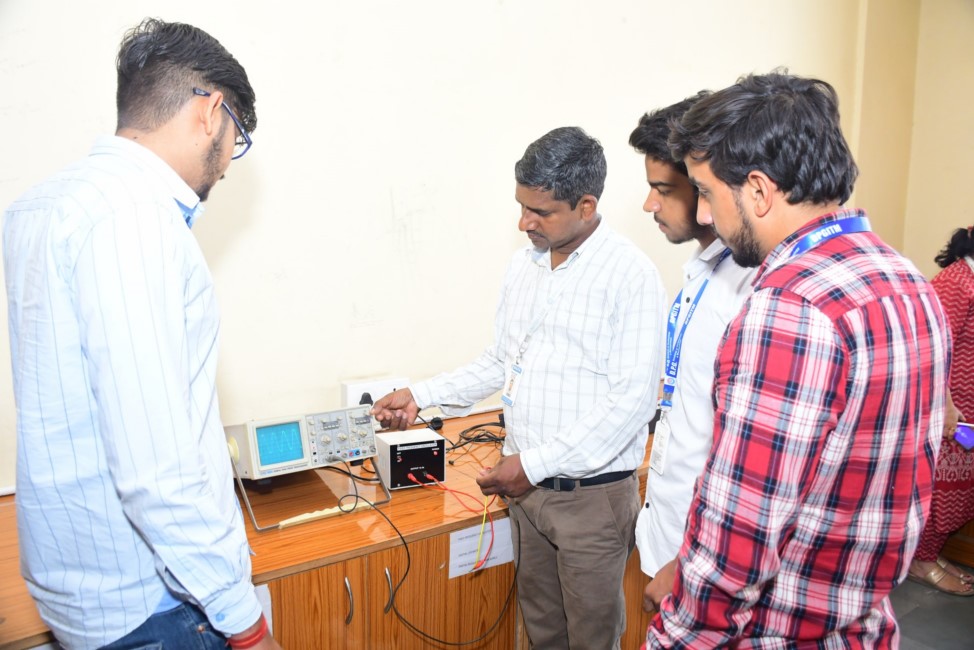
Computer Aided and Electric Machine Design
In this lab students are introduced to simulation based Software MATLAB. Experiments are studied using SIMULINK . Students learns about computer applications in power. Simulations based on fault analysis, modelling of machines, controllers are done.
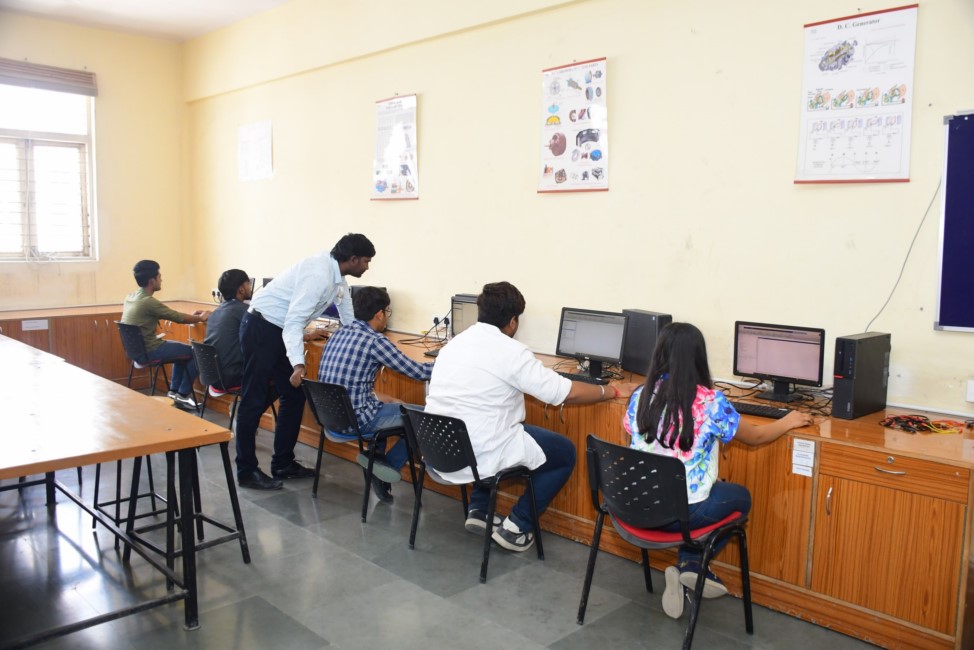
Measurement and Instrumentation Lab
The purpose of this laboratory is to acquaint you with several of the electronic instruments that you will be using routinely in future labs. You will be asked to use these instruments to perform a number of simple measurements using Multimeters, Voltmeters and Ammeters.
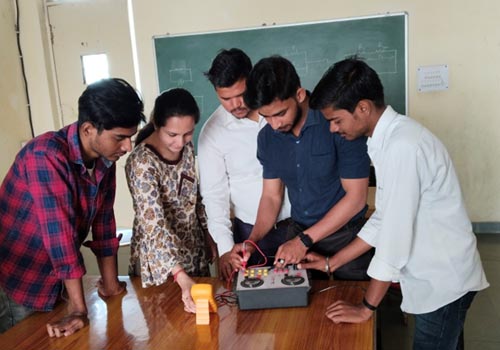
Power System Lab
Power system laboratories should be developed and fully developed to educate capable power engineers, who would be able to easily integrate with the industry workforce. There are various tools and methods of using these tools, which can be utilized in power system laboratories. Particularly, hands-on hardware-based equipment or simulation-based software packages can be used. Also, the utilization of laboratories depends on the teaching-learning methodology.
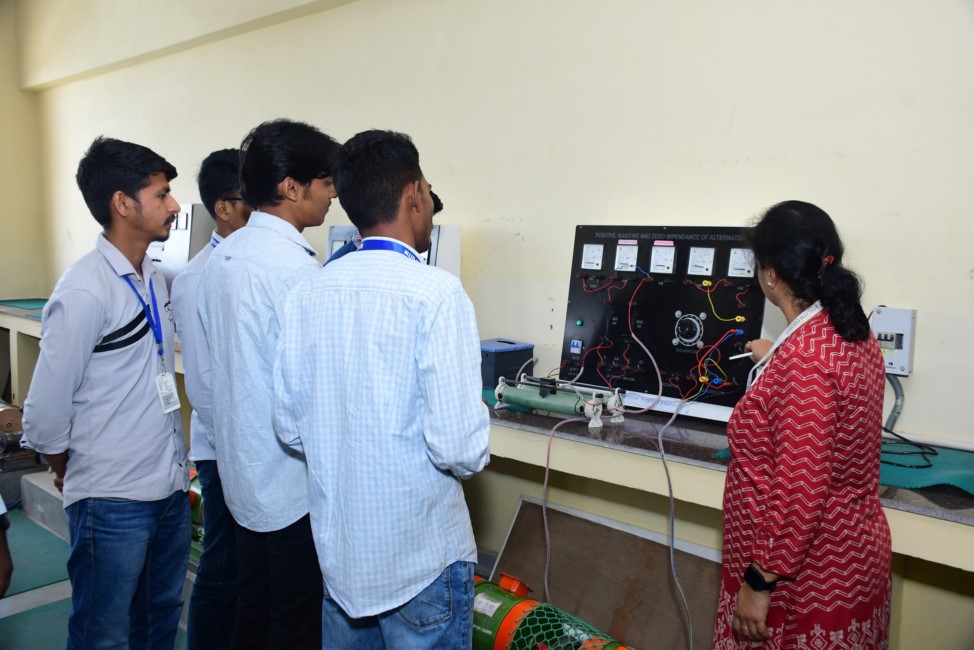
Employment Opportunities
Employment Opportunities
There is a great demand for electrical engineers in every field. Electrical Engineers are highly employable, as their training is not limited to a specific profession but encompasses a branch of science and is the most interesting branch of engineering. Electrical engineers may work on diverse fields such as Design of household appliances, Electrical System Design for Building Construction, Electric Vehicles/Cars, Railways, Airports, Robotics, Aerospace, Sophisticated medical equipment in hospitals, Electric power generating installations, Electricity Transmission and Distribution etc. Job opportunities are ample in both private and public/government sectors.
| CAREER IN GOVERNMENT SECTOR | CAREER IN PRIVATE SECTOR |
| Power Grid Corporation of India Limited | ALSTOM India |
| Bharat Heavy Electricals Limited (BHEL) | ABB |
| National Thermal Power Corporation Limited (NTPC) | General Electric (GE) |
| Hindustan Aeronautics Limited (HAL) | Schneider Electric |
| Defence Research and Development Organization (DRDO) | Larsen & Toubro Limited |
| Indian Space Research Organization (ISRO) | Crompton Greaves Power and Industrial Solutions Ltd |
| National Hydroelectric Power Corporation | HCL technologies |
| Oil and Natural Gas Corporation (ONGC) | Crompton Greaves Consumer Electrical |
| Indian Oil Corporation Ltd (IOCL) | Bajaj Electricals Ltd (BEL) |
| Bharat Petroleum Corporation Limited | Siemens |
| Hindustan Petroleum Corporation Limited | Jindal Steel & Power |
| Indian Railways – RRB | Tata Steel |
| Gas Authority of India Limited (GAIL) | Tata Motors |
| Steel Authority of India Limited (SAIL) | Tata Refractories Limited |
| Air India | HBL Power Systems Limited |
| Defence Services | Reliance Power |
| National Aluminum Company Limited (NALCO) | Micron Electricals |
| Bharat Dynamics Limited | Halonix |
| Airports Authority of India | Wipro Lighting |
| National Mineral Development Corporation | Tata Consultancy Services (TCS) |
| Engineers India Ltd (EIL) | Apple |
| National Fertilizers Limited (NFL) | IBM |
| Container Corporation of India Ltd. | |
| Bharat Electronics Limited (BEL) | Samsung |
| Centre for Development of Advanced Computing (CDAC) | Microsoft |
| Council of Scientific & Industrial Research (CSIR) | Sony Corporation |
| Central Power Research Institute (CPRI) | In addition to the core electrical companies, companies such as Toshiba, INFOSYS, WIPRO, CTS, IBM, Oracle, Intel, Bosch, Ericsson, HP etc. also recruit a large number of Electrical Engineers. |
CAREER IN TEACHING OR RESEARCH
Electrical engineers can opt for the teaching field or for research and development. Teaching career is rewarding, with the top engineering colleges offering very attractive remuneration packages. Also, lots of research works are going on in India and abroad for many areas related to electrical engineering. CSIR, CPRI, IGCAR, DRDO, ISRO are some government bodies that provide you opportunities for research in the field. ABB, GE India, Tata, Robert and Bosch are MNCs who have emerging R&Ds in India that offer you the same.
JOBS FOR ELECTRICAL ENGINEERS ABROAD
There are numerous employment opportunities for electrical engineers abroad. This is because of the presence of various design, manufacturing and construction firms, power generation units etc. outside India. Electrical Design Engineers also can try their luck in multidisciplinary engineering consultancies.
ELECTRICAL ENGINEERING CONSULTANCY
Electricity is an integral part of life. An Electrical Engineering Consultant works in creating designs and drawings, electrifies buildings, installations, and systems. He works as a coordinator and administrator for the electrical workers, recognizes technical problems and analyzes them. Engineering services may include Lighting and controls, Power distribution, Energy efficiency and sustainability design, Energy conservation studies etc.
OTHER ARENAS FOR ELECTRICAL ENGINEERS
Being an electrical engineer, one need not compulsorily stick to core electrical. There are many inter- disciplinary research and projects requiring competent electrical engineers. A Graduate in EEE can go for diverse fields whether it is PSU Jobs, Construction, Automobiles, Steel, IT Industry, Consultancy, Mobile networking, Finance, Management, Hardware, Electronics Design, Business Development etc.
HIGHER STUDIES AFTER ELECTRICAL ENGINEERING
For those who are not interested in doing job just after graduation, there are options for higher studies such as:
- One can opt to pursue M. Tech by qualifying in GATE exam.
- To pursue MBA, the aspirant must qualify CAT or similar exams.
- To pursue an M.S degree abroad, GRE is accepted globally.
THE FUTURE – ELECTRICAL ENGINEERING PROVIDES YOU WITH ENDLESS OPPORTUNITIES…
Renewable Energy Industry is a fast-growing industry in the world. The future of Renewable energy sector in India looks quite promising as India is ranked fourth in the world in the renewable energy country attractive index. According to IBEF (India Brand Equity Foundation), the total installed renewable energy capacity in India is around 32.26 per cent of total energy capacity of the country. It is expected that by the year 2040, around 49 per cent of the total electricity will be generated by renewable energy, giving the renewable energy sector the potential to create numerous employment opportunities at all levels. Another fast-growing industry is that of Electric vehicles (EVs). They are cleaner and more efficient; plus, over time, more and more electricity will come from renewable sources. The government wants 6 million EVs on Indian roads by 2020 and India wants only electric vehicles to run on its roads by 2030 as part of its commitment to the global agreement on climate change. The lead players in the Automobile industry are making huge investments in electric vehicles. It is estimated that globally, EVs will account for 90% of light vehicle sales by 2050, creating vast job opportunities for electrical engineers in India and abroad. There will never be a fall in scope for Electrical engineering. In today’s world and in future, there will never be a phase without electrical engineering. The scope and the opportunities of electrical engineering are abundant and evergreen!
Clubs
Training & Placement
Training & Placement
Syllabus and Scheme of Study
Syllabus and Scheme of Study
Previous Year’s Question Papers
Previous Year’s Question Papers
Basic Electrical Engineering
| Title | Download |
|---|---|
| B.Tech 1st Sem Apr 2021 | Download |
| B.Tech 2nd Sem May 2019 | Download |
| B.Tech 1st Sem Dec 2018 | Download |
Computer Aided Electrical Machines Design
Electrical Machines
Electrical Machines
| Title | Download |
|---|---|
| Biology 4rd Sem Jul 2021 | Download |
| Conventional & Renewable Energy Resources 6th Sem Jul 2022 | Download |
| Digital Electronics 4rd Sem Jul 2021 | Download |
| Electronics Design Laboratory 6th Sem Jul 2022 | Download |
| Energy Management & Auditing 8th Sem Jul 2022 | Download |
| Electrical Machines II 4th Sem Jul 2021 | Download |
| Electromagnetic Fields 4th Sem Jul 2021 | Download |
| Mathematics III 4th Sem Jul 2021 | Download |
| Power Electronics 6th Sem Jul 2021 | Download |
| Power Quality & Facts 6th Sem Jul 2021 | Download |
| Power System II 6th Sem Jul 2021 | Download |
| Power System Protection 6th Sem Jul 2022 | Download |
| Signals & Systems 4th Sem Jul 2021 | Download |
| Special Electrical Machines 8th Sem Jul 2022 | Download |
| Solar Thermal Applications 8th Sem Jul 2022 | Download |
| Transmission & Distribution 4th Sem Jul 2022 | Download |
